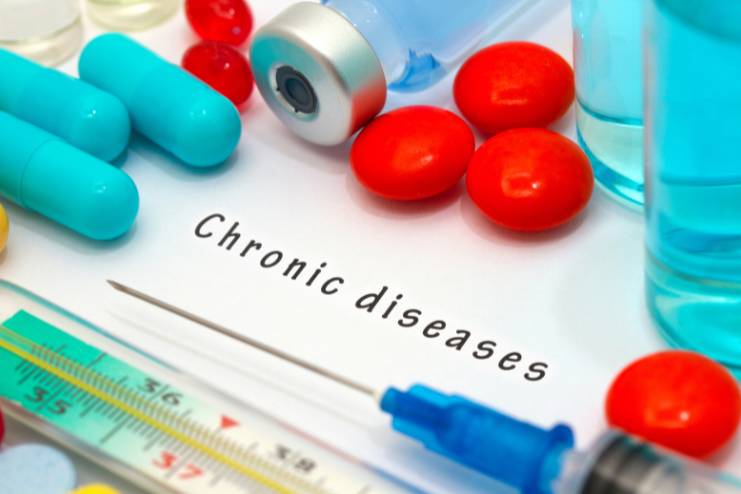Affiliate Disclaimer
Some links in this article are affiliate links. We may earn a small commission if you make a purchase through these links, at no extra cost to you. We only recommend products we find useful to our readersSince appetite alerts the body when it needs food and energy, it is essential for preserving general health. It ensures the consumption of vital vitamins and minerals, promoting healthy physical processes, a robust immune system, and mental well-being.
Occasional lack of hunger is typical. Knowing why this is happening can assist in managing possible vitamin deficits, finding underlying health issues, and maintaining a balanced diet.
1. Stress and Anxiety

Stress and worry can majorly affect hunger because it disrupts the body’s hormonal equilibrium. Depending on the individual, cortisol, a hormone the body releases in response to stress, can either increase or decrease hunger. Chronic stress frequently reduces appetite because the body suppresses the digestive system in a fight-or-flight response.
Many people lose their appetite when they’re under a lot of stress, like right before a big test, right after changing jobs, or right before a personal crisis. These circumstances make the body prioritize the stress reaction above hunger signals, which can then lead to a decrease in food consumption.
Anxiety has the potential to permanently alter appetite, making it challenging to stick to a regular eating schedule.
An excellent stress management strategy can support regular appetite. Practices including deep breathing techniques, mindfulness meditation, and regular exercise can decrease stress. Keeping a balanced schedule, looking for social support, and getting enough sleep is also critical.
Seeking professional assistance from a therapist or a counselor can help people who are dealing with ongoing stress or anxiety create coping mechanisms and enhance their general well-being.
2. Depression

An essential effect of depression on the appetite is often an increase or decrease in food intake. This mood disorder alters the neurotransmitters in the brain that regulate mood and appetite, including dopamine and serotonin.
Depression can reduce appetite and interfere with regular eating habits. A lack of interest in food, missing meals, unintentional weight loss, and diminished enjoyment of once-favorite foods are all indicators of depression-related appetite loss. Other symptoms of depression, such as exhaustion, difficulty concentrating, sleep difficulties, and ongoing melancholy, may accompany this. These dietary adjustments may make depression’s mental and physical symptoms worse.
If depression-related appetite loss lasts more than a few weeks, it is imperative to get treatment, especially if it causes substantial weight loss or interferes with day-to-day functioning. Seeking advice from a medical specialist, like a therapist or psychiatrist, can offer suitable treatment alternatives, such as medication, therapy, and lifestyle modifications. Early intervention can enhance results and promote general physical and mental well-being.
3. Illness or Infection

Common ailments like the flu, stomach bugs, and other infections frequently cause a person to feel less hungry. The symptoms of conditions such as influenza, respiratory infections, and gastroenteritis might include exhaustion, nausea, and vomiting, all of which can reduce the urge to eat.
When a person is ill, their body naturally reduces their food intake to preserve energy for healing and recovery. These diseases set off the immune system, which takes energy away from digestion and toward eliminating the infection. The body devotes more energy to the immune system during illness to fight against diseases. Because of this change in energy focus, the digestive system has less energy available, naturally reducing hunger.
Drink plenty of water and eat healthy foods that are easy to digest, such as crackers, soups, and broths, to aid in the healing process. Include foods that are high in nutrients, such as fruits and vegetables, which aid in vitamin and mineral replenishment. Recovery requires rest and plenty of sleep. See a medical specialist to rule out any problems or subsequent infections if appetite loss continues after the illness.
4. Medications

An inability to eat can be an adverse effect of many drugs, including antimicrobials, chemotherapeutic agents, antidepressants, opioid painkillers, and beta-blockers, among others. Stimulants like Adderall and Ritalin, which are used to treat ADHD, can also drastically decrease appetite. Popular over-the-counter medications, such as several anti-allergy and cold medications, may impact hunger levels.
Consult your doctor if you have a decrease in appetite following the commencement of a new medicine. Record all the medications you take and any dietary modifications you make. These changes could impact your daily life.
Find out if there are any less harmful pharmaceutical options or whether changing the dosage might be beneficial. Additionally, your doctor can advise you to incorporate foods that increase your appetite or change the timing of your meals to minimize this side effect. Finding a solution that preserves your health and well-being requires an open conversation between you and your healthcare professional.
5. Chronic Diseases

Chronic conditions like diabetes, cancer, heart disease, and renal disease can have a significant impact on appetite.
Blood sugar fluctuations brought on by diabetes can alter one’s appetite.
Chemotherapy and radiation are two standard cancer therapies that cause nausea, altered taste buds, and decreased appetite.
Due to increased stress and metabolic demands on the body, heart and kidney disease can cause fatigue and appetite loss.
Chronic illness-related hunger management calls for specialized tactics to ensure appropriate nutrition. Small, frequent meals might be beneficial, particularly if large meals become too much to handle. Smoothies and other high-protein snacks are examples of nutrient-dense foods that can guarantee an adequate intake of nutrients.
It’s critical to treat specific symptoms; for example, blood sugar monitoring can help manage changes in appetite associated with diabetes, while anti-nausea drugs can relieve nausea following cancer therapy. Personalized food programs can be created with medical specialists, such as dietitians, to promote general health and successfully manage disease symptoms.
6. Nutritional Deficiencies

Deficits in specific nutrients, like iron, zinc, or vitamin B12, might cause a decrease in appetite. A lack of vitamin B12, necessary for energy metabolism, can result in fatigue and decreased appetite. Anemia-related iron deficiency can result in fatigue and loss of appetite. Zinc significantly impacts taste and smell, and a shortage of zinc can make food seem less appetizing, which may lead to people eating less. Weakness, pale complexion, brittle nails, weariness, and dizziness are symptoms of dietary inadequacies.
Include nutrient-rich meals to help counteract these deficiencies and increase your appetite. Incorporate sources of vitamin B12 such as dairy products, meat, and fortified cereals. Lean meats, beans, and spinach are high in iron. Be sure to consume these with foods high in Vitamin C, as it improves iron absorption. Whole grains, seeds, and nuts are very good sources of zinc. See a doctor for individualized dietary guidance and possible supplementation if the deficits are severe.
7. Digestive Disorders

Digestive conditions like Crohn’s disease, ulcerative colitis, and irritable bowel syndrome (IBS) can significantly affect appetite. These illnesses result in persistent gastrointestinal tract inflammation and irritation, producing symptoms like nausea, diarrhea, cramps, bloating, and stomach pain. These unpleasant sensations might reduce the desire to eat and frequently cause an appetite decline.
Stay away from trigger foods, which may include fatty, spicy, and high-fiber foods that might aggravate symptoms. It can be calming to include easily digested meals such as rice, toast, applesauce, and bananas (sometimes known as the BRAT diet). It’s also critical to stay hydrated and consider taking nutritional supplements to prevent deficiencies. Working with a healthcare professional, like a dietitian or gastroenterologist can help you find individualized solutions to control symptoms and maintain proper nutrition, enhancing your overall health and appetite.
8. Hormonal Changes

Hormonal changes like menopause and thyroid diseases can affect hunger and appetite. Low estrogen levels during menopause can influence appetite-regulating leptin and ghrelin. Due to this hormonal imbalance, some people may gain weight and crave more, while others may lose appetite.
Hypothyroidism and hyperthyroidism can also affect appetite. Due to enhanced metabolism, hyperthyroidism may promote weight loss and increased appetite, while hypothyroidism causes weight gain and decreased appetite.
Natural hormone balance requires lifestyle and dietary modifications. Exercise, stress management like yoga or meditation, and sleep can control hormone levels. A balanced diet of the fruits, vegetables, whole grains, and lean proteins improves hormonal equilibrium. Omega-3s, vitamin D, and antioxidants enhance hormone production and regulation. A doctor or endocrinologist can help you manage hormonal changes naturally or medically.
9. Aging

Due to physiological and behavioral factors, appetite and eating habits fluctuate with age. A slower metabolism diminishes the sense of taste and smell, and dental difficulties, drugs, and digestive function can impair hunger in older persons. Social issues like loneliness and living alone can also affect eating patterns.
Healthy Eating Tips for Seniors
Older folks need appropriate eating habits to get enough nutrition. Here are some tips:
Nutrient-Dense Foods: Consume fruits, vegetables, whole grains, lean meats, and low-fat dairy to meet your needs for nutrients.
Small, Frequent Meals: Smaller daily meals are easier to manage.
Hydration: Have plenty of water and fluids since thirst may decrease with age.
Regular Physical Activity: Regular exercise boosts hunger and builds muscle.
Socialize During Meals: Socializing during meals boosts appetite and enjoyment. Try community feeding programs or social clubs.
Seek medical advice if you notice any major changes in appetite or eating habits, talk to a doctor to rule out health issues and get specific advice.
These measures can help older people maintain their health through a balanced diet and healthy eating.
10. Smoking

Smoking can disrupt many bodily systems, including the digestive system. The chemicals in cigarettes may cause nausea and vertigo, but the body’s resilience is evident in its ability to return to normal function. This gastric stimulation may cause your gastrointestinal (GI) system not to work normally, frequently decreasing appetite. However, the body’s capacity to absorb nutrients and digest food can gradually improve, leading to a return to normal digestive function.
Interestingly, many ex-smokers report a significant increase in appetite after quitting. This resurgence of appetite is a positive sign that the digestive system is returning to its normal function. As a result, ex-smokers often gain weight, typically around 10% of their body weight. While weight gain may seem undesirable, it is a temporary side effect of the body adjusting to a smoke-free lifestyle. Significantly, the short-term weight gain is far outweighed by the long-term health benefits of quitting smoking.
11. Mental Health Disorders

Many mental health problems affect appetite, causing significant changes in eating habits:
The Post-Traumatic Stress Disorder or (PTSD): people having PTSD may lose their appetite during stress or overeat as a coping tactic.
Obsessive-Compulsive Disorder (OCD): Food obsessions and eating rituals can alter appetite management.
When to Seek Help and Coping Strategies:
Mental illness-related hunger changes necessitate a holistic approach:
Therapy and Counseling: CBT and other therapies can help people improve their food interactions and manage emotional triggers that affect appetite.
Medication: Medication for mental health conditions might affect appetite. Discussing hunger changes with a psychiatrist or doctor is crucial.
Healthy Coping Mechanisms: Regular exercise, mindfulness, relaxation, and a supportive social network can reduce stress and increase well-being.
Seeking specialist Help: If appetite fluctuations affect everyday life or cause unhealthy weight changes, visit a mental health specialist. They can tailor treatment and support to address appetite problems.
Addressing mental health issues and using appropriate coping methods can enhance appetite management and quality of life.
12. Lifestyle Factors

Busy lifestyles can cause irregular eating and meal skipping, harming health. Skipping meals disrupts metabolism, causing blood sugar swings and energy dumps. It may also lead to overeating or eating unhealthy convenience foods later in the day.
Meal Planning and Priority
Plan and prioritize meals to maintain a balanced diet despite a busy schedule:
Meal Prep: Cook large batches of food to portion out for the week.
Healthy Snacking: Keep fruits, nuts, yogurt, and cut-up vegetables on hand.
Mindful Eating: Enjoy each bite without distractions, savoring the flavors and textures to enhance your eating experience.
To prioritize your health, schedule food breaks in your hectic day as non-negotiable appointments.
These tips can help busy people eat well and stay healthy.
13. Eating Disorders

Anorexia and bulimia are serious mental health illnesses that involve harmful diet, weight, and body image attitudes. Symptoms may include:
The Anorexia Nervosa: A severe dietary restriction, severe anxiety of gaining weight, distorted body image, and excessive body activity, and the refusal to regulate weight.
The Bulimia Nervosa: Binge eating followed by self-induced vomiting, laxative or diuretic abuse, fasting, or strenuous exercise. May cause guilt and shame, or concealment of eating habits.
Get Help
Eating disorder treatment is essential for recovery and well-being:
Therapy: Addressing emotional and behavioral patterns using CBT, DBT, and FBT helps treat eating disorders.
Medical Supervision: Psychiatrists, nutritionists, and primary care physicians collaborate to monitor health, handle difficulties, and provide dietary counseling.
Support Groups: Peer and support groups can offer encouragement, shared experiences, and coping skills.
Hospitalization: Specialized eating disorder treatment clinics may prescribe hospitalization for severe cases requiring medical stabilization.
Early intervention and personalized treatment approaches can help eating disorder patients. For advice and help, consult a doctor or eating disorder professional.
14. Pregnancy

During pregnancy, hunger changes differ between trimesters. Early pregnancy hormone changes, especially progesterone, can cause nausea and food aversions, reducing appetite for some women. Many pregnant women have increased appetites in the second trimester as morning sickness subsides and energy needs rise to support fetal growth. Physical discomfort and the developing uterus compressing the stomach may again affect appetite in the third trimester.
Appetite-Management Tips Each Trimester:
First Trimester: Small, regular meals reduce nausea. Choose bland, readily digestible foods like crackers, bread, and ginger tea. Hydrate to relieve symptoms.
Second trimester:
- Eat nutrient-dense foods for embryonic development.
- Include all dairy, fruits, vegetables, whole grains, and lean proteins.
- Under medical supervision, track weight growth.
Third Trimester: Eat smaller meals more often to soothe digestion and avoid heartburn. Constipation can be treated by eating fiber-rich meals and drinking water.
Consult a Healthcare Provider: Discuss substantial hunger changes or concerns with a healthcare professional. They may offer individualized guidance and monitor mother and fetal health throughout pregnancy.
Changing their diet and obtaining professional advice can help pregnant women promote their health and infant development throughout each trimester.
Conclusion
Maintaining general health and well-being requires understanding the causes of appetite loss. We’ve examined several variables affecting hunger, including stress, mental health conditions, hormonal shifts, and lifestyle choices.
It’s critical to pay attention to your body and realize when changes in hunger could point to underlying medical issues. Consult a physician if you have a chronic loss of appetite or notice substantial changes in your eating patterns.
To support your health goals, healthcare professionals can offer individualized advice, spot possible problems, and assist you in maintaining a balanced diet.
-
Dec 2020Written by Somapika D
-
July 2024Edited by Ankita
In this Article




















